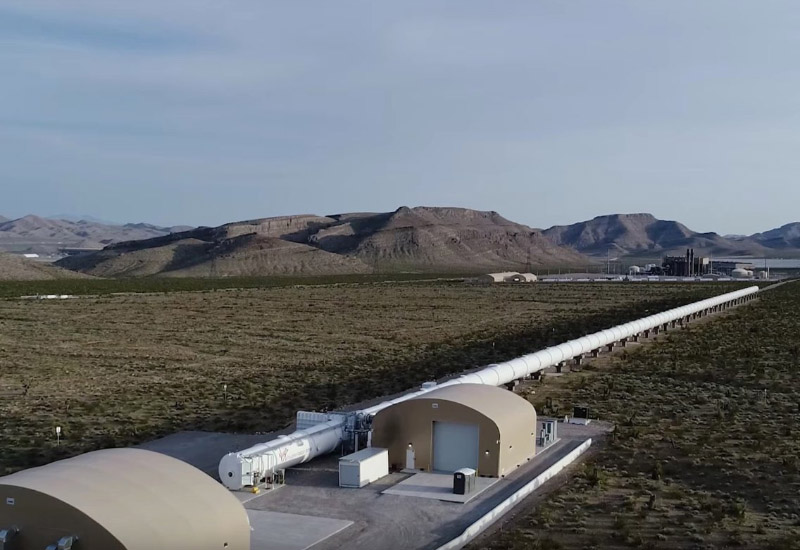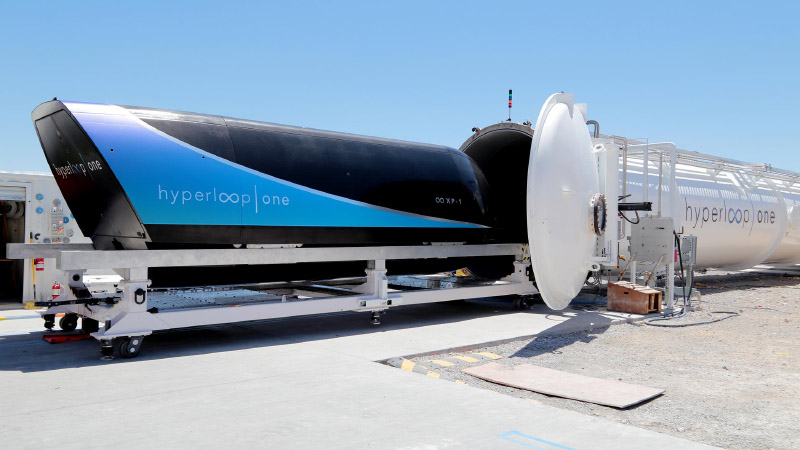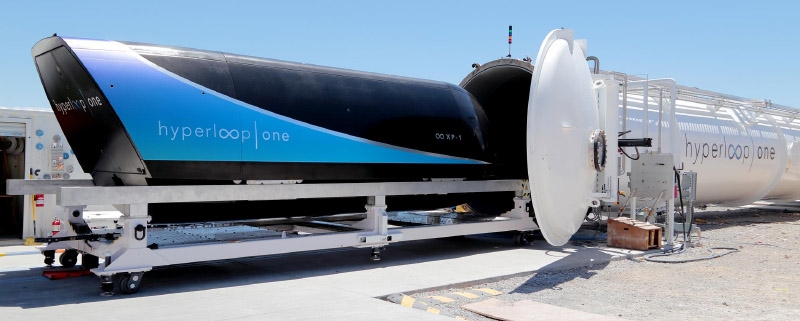Annual Transit Meeting Hears About Potential “Hyperloop” in the Triangle
Cary, NC – Hyperloop transportation boasts airplane-like speeds at train-like costs, all without immediate pollution or emissions. Local leaders in both government and business gathered in Cary to hear a presentation and see if the state that was first in flight will be first in loop.
A New Form of Transportation
Virgin Hyperloop One, one of several private companies working on developing hyperloop technology, held a presentation at the yearly Regional Transportation Alliance on Friday, July 12, 2019 at the Umstead Hotel in Cary.
The company is looking for a site to build its first commercial hyperloop line, while Virgin currently has a test site (titled “Devloop”) in the desert outside of Las Vegas, Nevada. Hyperloop operates much like a train – small cars or “pods” run on a set track to and from a destination. But Ryan Kelly, head of marketing and communications for Virgin Hyperloop One, said the technology is so different, they consider hyperloop a whole new form of transportation.
“We haven’t seen a new form of transportation in 100 years,” Kelly said.
Virgin’s hyperloop pods run in a large constructed tube, with magnetized floor panels so the pods are levitating off of the track as they move to their destination. Also, the air pressure is vacuumed out of the tubes so there is little to no aerodynamic drag. As hyperloop runs over long distances, Kelly said they will be able to run pods at 300 meters per second, or 671 miles per hour.
“It will connect metro cities like metro stops,” Kelly said.
At the Devloop site, currently they have been able to run pods at more than 250 miles per hour over 0.3 miles of track, though Kelly said over longer tracks, speeds will increase.
“There have been a lot of changes made since our first ‘Kitty Hawk’ test,” said Ismaeel Babur, engineer with Virgin Hyperloop One.
Kelly said pods store 28 passengers and between four and six could be sent out at a time currently, but the plan is to set up hyperloop stations so not only are pods being sent out in quick succession but they make sure that they are around 80 percent loaded when sent out.
“The economics of this only work out if it’s a ‘mass’ transit system,” Kelly said.
Other advantages Kelly listed are hyperloop tubes are only around 15 to 20 feet wide so it would take up less space than commuter rail, and there are no direct carbon emissions, making it more energy efficient than air travel.
“It runs on electricity so it’s as clean as the grid is,” Kelly said.
But hyperloop would not only be used for passengers, as they are also designed to transport cargo, as Kelly put it,
“at flight speeds with trucking costs.” Joe Milazzo II, executive director of the Regional Transportation Alliance, said the market would have to determine what the ratio is of passengers to cargo.
“Even if it’s 80 percent cargo and 20 percent passengers, that’s still more hyperloop than we have now,” Milazzo said.
Virgin Hyperloop One has raised more than $370 million in investments, Kelly said, from venture capital firms all over the world, including the United States, the United Arab Emirates and France.

Could It Happen Here?
This Regional Transportation Alliance was only about the potential and possibilities for hyperloop and not a promise of things to come.
“It’s not proven yet, it’s not certified yet,” said Alan Eckman, vice president of engineering firm AECOM, which worked with Virgin to create the hyperloop pre-feasibility study. “But it’s on its way.”
As for where a hyperloop tube would run, Eckman showed graphics of tubes supported on raised columns in between stretches of highway (I-40 is more than 300 feet wide, for example, while their tubes are between 15 and 20 feet wide), and even suggested tubes could be stacked on top of one another.
For the Triangle area, Eckman said, if built, a hyperloop could connect Downtown Raleigh to Downtown Durham in nine minutes.
“It’s new access to affordable housing. It’s new access points for employers,” Eckman said.
If built, Kelly and other speakers at the meeting said this would be a private-public partnership, and Jason Orthner, director of the NCDOT Rail Division, said the state is already looking into acquiring lightly used rail routes.
Scott Levitan, CEO and president of the Research Triangle Park, said NCDOT and the state business community should take a chance on hyperloop but he was not optimistic about the Triangle getting hyperloop before other states and metro areas.
“Despite all our resources and efforts, we’ve competed with and lost to all these cities already,” Levitan said.

Upcoming Transportation Changes
Even if Virgin Hyperloop One, or another hyperloop company, comes to the Triangle, residents should not expect to buy a ticket for many years. But the Regional Transportation Alliance meeting also included updates on changes to roads and buses that are happening soon.
Both I-40 and I-440 are both under construction currently, and Milazzo said I-440 should be completed this Autumn. One other major highway project is I-885, which will connect Raleigh and Durham drivers.
“Right now, you have to take NC-147 to get to Durham,” Milazzo said. “In less than a year from now, that won’t be the case.”
Two other Triangle roads, US-70 and US-1, are being converted into freeways, though Milazzo said work on US-1 has been delayed.
Brad Ives, transit chair for the Regional Transportation Alliance, said all bus rapid transit corridors in the region should be open by 2027, with eastern corridors open by 2023. With the transportation bond referendum that was passed in 2016, he said by 2030, between $2 and 3 billion will be raised for local transit.
“With bus rapid transit, we don’t have to wait for perfection. We can get to it very soon,” Ives said.
Connecting bus rapid transit routes is an important component for this project, Ives said, pointing to a study in Virginia that saw ridership go up 17 percent when their bus rapid transit routes got linkages.
Ives also said there are plans for a commuter rail line that will run from Hillsborough to Clayton.
You can also learn about transportation plans for the future at NCMoves.org.
Story by Michael Papich. Photos courtesy of Alexander Esseveld with Virgin Hyperloop One.




Really cool technology…I hope Cary wins the location!